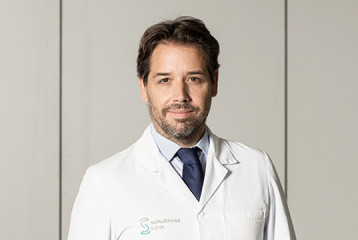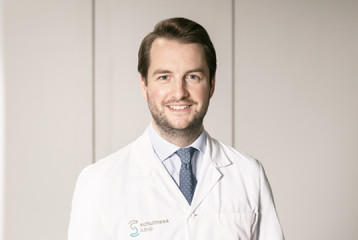News Better prognoses of postoperative frozen shoulder in rotator cuff tears
The research department of Shoulder and Elbow Surgery has once again published groundbreaking results, this time for a known and hitherto unsolved problem after rotator cuff surgeries: frozen shoulder. Thanks to a study based on our comprehensive rotator cuff registry there are now better prognosis and prevention options.
There are various causes of frozen shoulder. It sometimes occurs, for example, after a shoulder injury as a result of a fall or in connection with diabetes mellitus. But until now, there have been very few studies or clear findings on frozen shoulder after rotator cuff tear arthroscopies. A postoperative frozen shoulder can make the subsequent course of rehabilitation more difficult because mobility is very limited and patients increasingly feel pain.
Largest rotator cuff registry in Switzerland
As a result of the continuous, longstanding work and documentation by Schulthess Klinik we now have our own rotator cuff registry – the largest in Switzerland – in which we have assessed several hundred surgeries since 2014. The evaluation of outcomes from over 1,300 patients has now allowed researchers to develop a prediction model. The study, published in the renowned American Journal of Sports Medicine (AJSM), came out of the cooperation with several expert groups, including from the University Hospital of Basel. The authors, led by Prof. Laurent Audigé, studied 29 different factors that are suspected to have a connection to postoperative frozen shoulder
Personalized prognosis and prevention.
In the end, we have developed a prediction model that can help us make a personalised prognosis. Women and patients with restricted mobility before the surgery suffered from frozen shoulder more frequently. Frozen shoulder was also more common when the tendons were not degenerated or only torn and in surgeries without acromioplasty (smoothing of the acromion).
Based on these findings, adapted rehabilitation protocols can be planned even before surgery to avoid frozen shoulder after rotator cuff surgery. At Schulthess Klinik, we are currently conducting further studies to look at this issue in more depth and to enable our patients to heal faster with a rapid recovery program.
The study results have been presented at international congresses already, for example, by Prof. Dr. Laurent Audigé, Head of Research Group Upper Extremities and Hand Surgery, at DVSE (Congress of the German Shoulder and Elbow Surgery Association) and by David Endell, Junior Consultant Shoulder and Elbow Surgery, at the German Congress of Orthopaedics and Traumatology.
To the study “Prediction of Shoulder Stiffness After Arthroscopic Rotator Cuff Repair”

